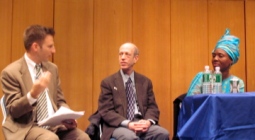
On Wednesday, November 28th, AFJN hosted a panel discussion on AFRICOM in conjunction with the Council on African Studies at American University in Washington, DC. The event, titled “Africa’s Oil, America’s AFRICOM, and the Global War on Terror” was the first attempt by the AFRICOM Working Group* to inspire the public to action.
As we continue to visit Congressional offices to voice our apprehension about AFRICOM, it becomes clear that Congress largely supports the new command structure and its perceived purpose. This is of significant concern to AFJN and others who see a militarization of America’s engagements abroad. Wednesday’s panel provided a look into the true motives and likely outcomes of the new US military command for Africa. The goal was to amplify the concerns coming out of the continent and to begin an education and awareness campaign that will lead to true transformation of United States foreign policy in Africa.
Panelists Emira Woods of Foreign Policy in Focus and Nicole Lee of TransAfrica Forum drew connections between the war in Iraq and Afghanistan to the rhetoric and ideology that has been so pervasive in the planning of AFRICOM. The origins of both missions stem from the same Administration – an Administration that has relied heavily on defense above development and diplomacy. Furthermore, private military contractors, whose actions have scarred the Pentagon’s reputation in Iraq, are vying for contracts from the Defense Department to take a leading role in AFRICOM.
If such parallels can be drawn, citizens of the United States who have consistently opposed the military establishment as a method of attaining global security ought to be equally disturbed by the new Africa Command. It goes beyond recognizing that “war is not the answer” to understanding that the mere institutions that have made it possible to go to war – the “military industrial complex” – are also incapable of providing answers. Anti-war activists have every reason to engage in the debate on AFRICOM; indeed, we invite you to do so.
As advocates for the people of Africa, we recognize that a policy which puts people at risk without their consent is no policy at all. It is our hope, that with persistent education, awareness, and lobbying, we might persuade our policymakers to alter their course. We invite you to continue checking the AFJN website for news and analysis on AFRICOM, as well as ways you can get involved in halting the new command.
Special thanks to Carl LeVan and Mary Hansen whose efforts made “Africa’s Oil,America’s AFRICOM, and the Global War on Terror” possible. Also thanks to James Middleman, Daniel Volman, Ph.D., Emira Woods, and Nicole Lee for engaging and inspiring presentations.
*The AFRICOM Working Group includes AFJN, Foreign Policy in Focus at the Institute for Policy Studies, TransAfrica Forum, the African Security Research Project, Africa Action, the United Methodist Church, and others who have signed on to our one-pager.
-Beth Tuckey
